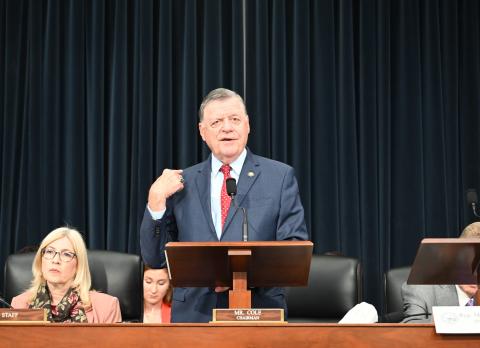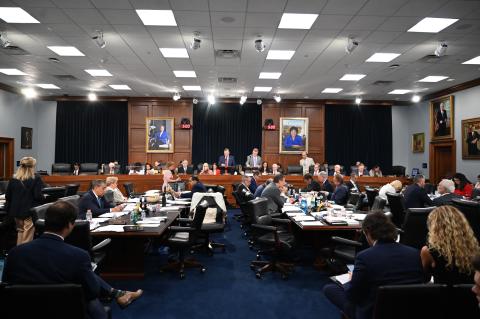Committee Approves FY26 Homeland Security Appropriations Act
Washington, D.C. – Today, the House Appropriations Committee met to consider the Fiscal Year 2026 Homeland Security Appropriations Act. The measure was approved by the Committee with a vote of 36 to 27.

Homeland Security Subcommittee Chairman Mark Amodei (R-NV) said, “The American people sent us here to clean up the chaos at the border, address the crime in our communities, and restore the law and order that was abandoned under the last administration. This bill delivers on that mission by fully funding the Department that protects the Homeland, and refocuses where necessary, to make sure this Department is only doing the job that Congress has authorized it to do – keep the American people safe. None of this would matter without the brave men and women on the frontlines, our agents and officers, who have been unfairly demonized simply for doing the hard work of defending our homeland, but we will not turn our backs on them. When I was entrusted with chairing this subcommittee, I knew we had both an opportunity and a responsibility to make our country safer and to push back against a status quo that too often bent a knee to violence, drug trafficking, and infiltration in our communities. Thank you to Chairman Cole, members of the committee, and staff for their dedication and urgency in moving this priority down the field, and to the Trump Administration for putting the safety of American citizens first. I look forward to its arrival on the House floor.”

Chairman Tom Cole (R-OK) said, “Our work here today is about one of our most important duties: keeping Americans and our homeland safe. Subcommittee Chairman Amodei enhanced safeguards at every level, advancing the America First promise of empowering our frontline agents to uphold our laws, deport criminal aliens, confront bad actors, and protect our country. Alongside renewed leadership in the White House, we are replacing the consequences of past weakness with a posture of strong U.S. preparedness. From our borders and ports to aviation and cyber, we deliver the personnel, training, and technology to reinforce our community defenses and confront those who wish us harm. I commend the advancement of this legislation, which ensures our laws are enforced, our agencies are equipped, and our citizens are protected.”
Subcommittee Chairman Amodei's prepared opening remarks are available here.
Chairman Cole's prepared opening remarks are available here.

The Fiscal Year 2026 Homeland Security Appropriations Act
The Homeland Security Appropriations Act provides a total discretionary allocation of $66.36 billion. The defense portion of the allocation is $3.29 billion, which is $41 million (1.22%) below the Fiscal Year 2025 enacted level. The non-defense portion of the allocation is $63.08 billion, which is $1.37 billion (2.05%) above the Fiscal Year 2025 enacted level.
The bill includes $6.3 billion in discretionary appropriations that are offset by fee collections and $26.47 billion as an allocation adjustment for major disaster response and recovery activities.
Key Takeaways
Champions public safety and homeland preparedness by:
- Upholding the America First vision by realigning the Department of Homeland Security’s (DHS) priorities around its fundamental mission: defending the nation against the threat posed by terrorists, criminals, and foreign adversaries and ensuring the safety and security of every American.
- Prioritizing border security and the detention and swift removal of criminal aliens.
- Enhancing resources to detect and counter the spread of deadly fentanyl that poisons our communities.
- Partnering with state and local law enforcement to enhance immigration enforcement and homeland defense capabilities.
- Protecting vulnerable children by strengthening exploitation investigations.
- Refocusing cybersecurity capabilities to address critical infrastructure threats from criminals and nation-state actors.
- Strengthening disaster preparedness, response, and recovery efforts for U.S. communities.
Supports the Trump Administration and mandate of the American people by:
- Prohibiting funding for Diversity, Equity, and Inclusion and Critical Race Theory.
- Prohibiting the government from labeling Americans’ constitutionally protected speech as “misinformation” and imposing a penalty of termination for such action.
- Prohibiting funding for providing or facilitating abortions for ICE detainees.
- Prohibiting gender-affirming care, including hormone therapy and surgery for ICE detainees.
Bolsters U.S. national security and border protections by:
- Providing $613 million to sustain 22,000 Border Patrol agents.
- Providing $346 million for border security technology.
- Providing $300 million for Non-Intrusive Inspection equipment.
- Providing $4.4 billion for custody operations to fund 50,000 ICE detention beds.
- Providing $1 billion to fund transportation and removal operations for criminal and/or removable aliens.
- Providing $1.6 billion to modernize Coast Guard cutters and aircraft to help secure our border.
Safeguards American taxpayer dollars and preserves core functions by:
- Ending programs that incentivized more illegal migration, such as:
- Eliminating the Shelter and Services Program for aliens, providing $650 million savings compared to Fiscal Year 2025 enacted level.
- Eliminating the Case Management Pilot Program for aliens, providing $20 million savings compared to Fiscal Year 2025 enacted level.
- Eliminating funding for costly soft-sided facilities used to process aliens, $1.7 billion less than Fiscal Year 2025 enacted level.
- Eliminating the duplicative Office of the Immigration Detention Ombudsman, saving $28.6 million from the Fiscal Year 2025 enacted level.
A summary of the bill is available here.
During the markup, Committee Republicans also stood with the America First agenda and rejected Democrat amendments that would have:
- Created a slush fund by attempting to over-resource an office beyond operational need.
- Restricted the ability to reform and improve FEMA.
- Limited where ICE can conduct enforcement actions.
- Weakened deportation and enforcement efforts.
Adopted Amendments
- Amodei (Manager’s Amendment) - Makes technical, bipartisan changes to the bill and report.
- The amendment was adopted by voice vote.
- Republican En Bloc – Makes technical edits, strengthens asylum eligibility to prevent abuse and reinforce legitimate claims, and includes reporting requirements regarding enforcement efforts.
- The amendment was adopted by voice vote.
- Bipartisan Visa En Bloc – Includes issuance expansions for certain visa categories and seasonal workers.
- The amendment was adopted by voice vote.
- Amodei #3 – Makes reforms to the FEMA Building Resilient Infrastructure and Communities grant program to prevent waste and abuse.
- The amendment was adopted by voice vote.
- Underwood #2 – Reiterates current law regarding member access at certain DHS facilities.
- The amendment was adopted by voice vote.
- Quigley #1 – Report language related to USCIS's Uniting for Ukraine program.
- The amendment was adopted by voice vote.
- Escobar #1 – Prohibits the deportation of U.S. citizens.
- The amendment was adopted by voice vote.
- Ciscomani #1 – Report language that encourages ICE to evaluate sensitive locations when executing immigration enforcement operations.
- The amendment was adopted by voice vote.
- Wasserman Schultz #4 and Amodei – Requires the Secretary to assess the recent Temporary Protected Status for Venezuelans determination.
- The amendment was adopted by voice vote.
Bill text, before adoption of amendments, is available here.
Bill report, before adoption of amendments, is available here.
A table of included Community Project Funding requests is available here.
###
